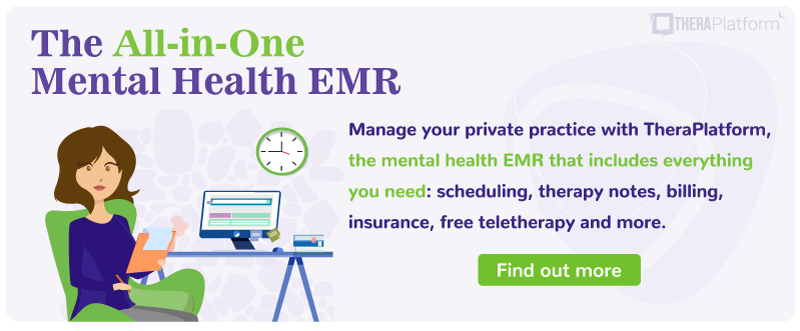Therapist mandatory reporting

Therapist mandatory reporting is an important function for providers to understand and learn as the number one job of a therapist is to keep their clients safe, and that especially pertains to children, who do not have the maturity, physicality, and legal status to stand up for themselves.
Reporting child abuse and neglect is an unpleasant but necessary part of the job for any therapist. It also brings about many questions and complications, as laws vary from state to state, and rules of confidentiality are challenged. Let’s explore what signs therapists must look for and the steps they need to follow to fulfill their child abuse reporting duties.

Do therapists have to report certain things?
Signs of abuse and neglect are reasons for therapist mandatory reporting. Abuse can be organized into four categories: physical abuse, sexual abuse, emotional abuse, and neglect. Here are some major indicators that therapists should look for when considering whether to report abuse and neglect:
Physical abuse
- Unexplained bruises or injuries
- The child seems frightened of parents or caregivers
- They abuse animals
- The parent is known to use physical discipline with the child
- The parent or caregiver provides unconvincing reasons for child injuries
Sexual abuse
- The child has unusual sexual knowledge for their age
- Nightmares or bedwetting
- Injury to private parts
- Runs away
- Attaches quickly to strange adults
Emotional abuse
- Acts overly compliant or demanding
- Child acts either inappropriately adult or inappropriately infantile
- Physical and/or emotional development is delayed
- An inability to develop emotional bonds with others
- The parent often criticizes or belittles child, or describes them in negative terms
Neglect
- Frequent school absences
- Lacks sufficient medical care
- Does not possess necessary clothing and may appear dirty or smelly
- The parent is not involved in the child’s schooling or activities
Note: Significant changes or extremes in behavior are always a sign that something notable is going on with a child. Therapists should note differences in sleeping, eating, school behavior, and socializing.
For a more detailed report of the signs of abuse, the U.S. government’s Child Welfare Information Gateway has a free downloadable pamphlet.
When do I need to report?
Therapists are mandated reporters of child abuse and neglect. Therapy mandatory reporting overrides any limits of confidentiality and the client must be informed (verbally and through writing) of this exception to confidentiality during the intake meeting. Because the concept of confidentiality is so integral to psychotherapy, the therapist must first make sure that they have the necessary reasons for therapist mandatory reporting. Here are some considerations when asking yourself if you need to undertake therapist mandatory reporting with a local agency.
- Therapists need to report child abuse if they hear credible reports of abuse or neglect from their clients and/or their parents. It is worth noting that it is not the job of the therapist to do a thorough exploration into the claims of abuse. That is the job of the investigating agency. However, the therapist must attempt to gather as much information as possible to provide a complete picture when reporting. Sometimes, a client makes a claim of abuse and then recants it. Unless the therapist is sure that the client lied about the abuse claim, it still falls under therapist mandatory reporting and must be reported.
- Therapists also need to make reports for non-clients. That means if they hear about child abuse - even if it doesn’t involve their client - they still need to report it. For instance, maybe your minor client mentions that his friend’s parents are hitting him and that he has come to school with bruises. A therapist would need to obtain as much information as possible and report it, even though they may not know the child personally.
- Each state has its own laws regarding child abuse and there are differences in exactly what has to be reported.
- Variations in reporting laws include:
- Most states have a religious exemption for those who refuse medical treatment for a child due to religious reasons. That means that parents may refuse to get their children certain medical treatments even though that may put the child’s life in danger. In states like New York, however, there is no religious exemption and the refusal of treatment could be viewed as child abuse.
- In Kentucky and Kansas, for example, corporal punishment is allowed as long as it doesn’t injure the child. However, corporal punishment would likely result in child abuse reporting in some other states.
- In many states, you don’t report abuse that happened in the past if the victim is now an adult. That may be waived, however, if there is reason to believe the perpetrator could still be abusing others.
As you can see, it is crucial that therapists educate themselves on the child abuse laws pertaining to the state in which they work. What is necessary for a report in one state, is not necessarily viable in another.
If you are unsure about whether or not you need to make a report, contact your state’s child abuse reporting agency and ask them. You can give a hypothetical situation without providing any identifying information. In that way, you are finding out whether you need to make a report without breaking confidentiality. Here is the contact information to report child abuse and neglect for each state.

How do I make a child abuse report?
Once you suspect that abuse or neglect has occurred, you must prepare to call the state or local agency that handles it for your jurisdiction (see above).
Take the following steps:
- Gather information. The agency you call to make the report will want as much information as you will give them. This includes identifying information about the victim, a description of the abuse, and your name and contact information. While you can make the report anonymously, that is not recommended. You want to be available to provide more information later if necessary and also be able to follow up with child services to receive updates about the case. It will also be noted that you performed your duty as a mandatory reporter.
- Make that call. Once you have your ducks in a row, you want to make the call. You should call as soon as possible but always before 24 hours. If you don’t call, you will be shirking your ethical and legal duty and may be liable for any injury that occurs after you find out about the potentially abusive situation. The person you call will lead you through the process, gather necessary data, and answer your questions. Make sure you obtain their contact information in case you later want to follow up.
- Inform the parents. If your client is the victim, it is recommended that you tell the parents that you made the report unless your admission might put the child in danger. For example, you would not want to tell the parent of a minor client if you thought they might get physically beaten for disclosing the abuse. Telling the parent can be a very uncomfortable situation (especially if they are the perpetrator or have allowed the abuse to occur), but they will likely find out anyway and it might help to salvage the therapeutic relationship. In addition, you might obtain more information to provide to the child welfare agency. Just be prepared that the parent might be upset and want to terminate therapy as a result.
- Evaluation: Child services should let you know whether the case has been accepted for evaluation. After that, they will initiate an investigation and either call you or send you a letter to let you know about the findings of the case. You can also follow up with them if you haven’t heard what is happening and want to know how the case is progressing.
Reporting child abuse and neglect is one of the most important—and potentially complicated—duties of any therapist. Client safety is your foremost concern but reporting child abuse has the potential to breach confidentiality, damage the parental therapeutic relationship, and lead to the termination of therapy.
Start 30-day Free Trial and explore TheraPlatform. HIPAA Compliant Video and Practice Management Software for Therapists.
Resources
Theraplatform is an all-in-one EHR, practice management and teletherapy solution that allows you to focus more on patient care. With a 30-day free trial, you have the opportunity to experience Theraplatform for yourself with no credit card required. Cancel anytime. They also support different industries including mental and behavioral health therapists in group practices and solo practices.
More resources
- Therapy resources and worksheets
- Therapy private practice courses
- Ultimate teletherapy ebook
- The Ultimate Insurance Billing Guide for Therapists
- The Ultimate Guide to Starting a Private Therapy Practice
- Mental health credentialing
- Insurance billing 101
- Practice management tools
- Behavioral Health tools
Free video classes
- Free on-demand insurance billing for therapist course
- Free mini video lessons to enhance your private practice
- 9 Admin tasks to automate in your private practice
References
American Psychological Association Practice Organization. (2013).Rporting child abuse and neglect. https://www.apaservices.org/practice/good-practice/reporting-child-abuse.pdf
Child Welfare Information Gateway (2019, April). What Is Child Abuse and Neglect? Recognizing the Signs and Symptoms. https://www.childwelfare.gov/resources/what-child-abuse-and-neglect-recognizing-signs-and-symptoms
Sandstrom, A. (2016, August 12). Pew Research Center. Most states allow religious exemptions from child abuse and neglect laws. https://www.pewresearch.org/short-reads/2016/08/12/most-states-allow-religious-exemptions-from-child-abuse-and-neglect-laws



